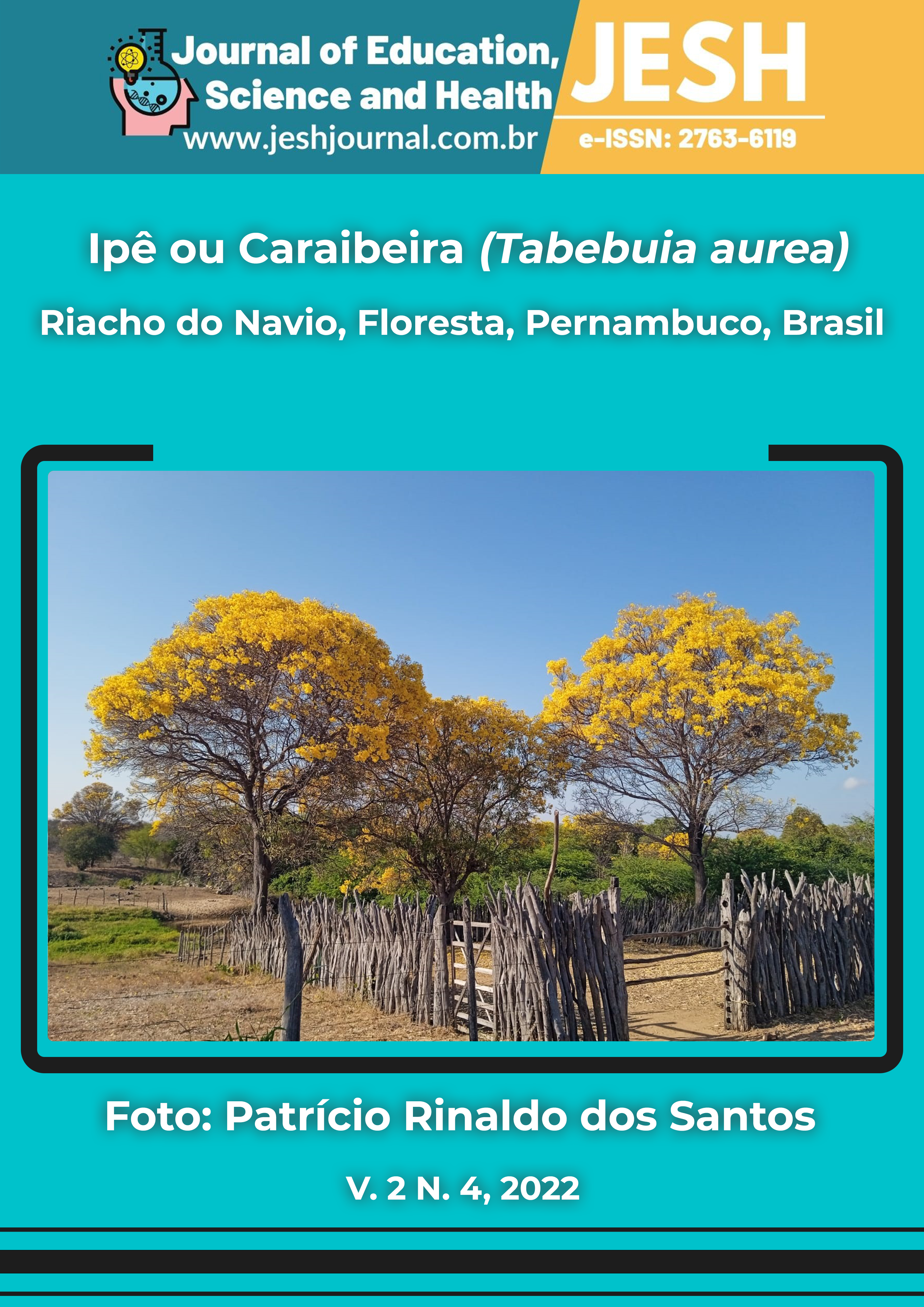The I Scientist”: Experience Report of the Project Carried out by Elementary School Students in the City of Feira Nova, Pernambuco, Brazil
DOI:
10.52832/jesh.v2i4.154Keywords:
Letramento científico, Ciência, Coronavírus, Alfabetización científica, Ciencia, Coronavirus, Scientific literacy, ScienceAbstract
Scientific literacy is the ability to employ scientific knowledge to identify issues, acquire new knowledge, and draw conclusions based on scientific evidence. This report aims to present the experience of a project with elementary school students, and aims to understand the scientific work, and the role of the scientist in society. For that, all phases of a scientific investigation were experienced. A research problem was presented “to know if elementary school students from two schools in the city of Feira Nova, Pernambuco, Brazil, knew the biological role of soap and water in the fight against contagion by the new coronavirus”. Having exposed the problem, the concepts of hypothesis, proof or refutation of a hypothesis, methodological design, data collection and treatment and scientific writing were worked on. The partial results of this experience point to questions that prove what the literature on scientific literacy brings, where, according to our findings, more than 50% of our students, despite having formal classes in Natural Sciences and Biology, most of the time has no idea how science is done, how a scientist works, and how he arrives at evidence-based results. This result worries us, especially at a time when the denial of science presents itself as a problem of this century, which reinforces the need for the research group to continue this project, carrying out activities that allow students to build a critical view of reality, and the ability to align what is studied in the classroom with this reality of the world.
Downloads
Metrics
References
Branco, A. B., Branco, E. P., Iwasse, F. A., & Akiko Nagashima, L. (2018). Alfabetização e Letramento Científico na BNCC e os Desafios para uma Educação Científica e Tecnológica. Revista Valore, 3, 702-713. https://doi.org/10.22408/reva302018174702-713 DOI: https://doi.org/10.22408/reva302018174702-713
Brasil. (2018). Ministério da Educação. Secretaria de Educação Básica. Base Nacional Comum Curricular. Ciências da Natureza, Matemática e suas Tecnologias. Brasília: Ministério da Educação/ Secretaria de Educação Básica. http://portal.mec.gov.br/index.php?option=com_docman&view=download&alias=13448-diretrizes-curiculares-nacionais-2013-pdf&Itemid=30192
Caponi, S. (2020). Covid-19 no Brasil: Entre o Negacionismo e a Razão Neoliberal. Estudos Avançados, 34, 209–224. https://doi.org/10.1590/s0103-4014.2020.3499.013 DOI: https://doi.org/10.1590/s0103-4014.2020.3499.013
Chassot, A. (2003). Alfabetização Científica: Uma Possibilidade de Inclusão Social. Revista Brasileira de Educação , 22, 89–100. https://doi.org/10.1590/s1413-24782003000100009 DOI: https://doi.org/10.1590/S1413-24782003000100009
Macedo, K., Alves, H. C. O., Santos, D., Silva, L., Gerson, & Da Silva, P. (2016). O ensino no Brasil e o PISA. Anais III CONEDU, Campina Grande.
https://www.editorarealize.com.br/index.php/artigo/visualizar/21576>.
OMS. (2020). Orientações da OMS para prevenção da covid-19. https://sbpt.org.br/portal/covid-19-oms/
Fontanive, N., Klein, R., Rodrigues, S., & Moraes, A. (2021). O que o PISA para Escolas Revela Sobre uma Rede de Ensino no Brasil? A experiência da Fundação Cesgranrio em 2019. Ensaio: Avaliação e Políticas Públicas em Educação, 29, 6-34. http://dx.doi.org/10.1590/s0104-40362020002900001 DOI: https://doi.org/10.1590/s0104-40362020002900001
Belela-Anacleto, A. S. C., Peterlini, M. A. S., & Pedreira, M. L. G. (2016). Higienização das mãos como prática do cuidar: reflexão acerca da responsabilidade profissional. Revista Brasileira de Enfermagem, 70(2), 442-5. http://dx.doi.org/10.1590/0034-7167-2016-0189 DOI: https://doi.org/10.1590/0034-7167-2016-0189
Pastorelli, F. (2020). Tudo o que você precisa saber sobre como lavar as mãos para se proteger contra o coronavírus. https://www.unicef.org/brazil/historias/tudo-o-que-voce-precisa-saber-sobre-como-lavar-maos-para-se-proteger-contra-o-coronavirus
Inep. (2021). Instituto Nacional de Estudos e Pesquisas Educacionais Anísio Teixeira. https://download.inep.gov.br/download/internacional/pisa/2010/letramento_cientifico.pdf
LeChevallier, M. W. (2013). Tratamento de Água e Controle de Patógenos: Eficiência do Processo na Obtenção de Água Potável Segura. Water Intelligence Online, 12 . https://doi.org/10.2166/9781780405858
Leite, L. R., Lima, & J. O. G. de. (2015). O Aprendizado da Química na Criação de Professores e Alunos do Médio: Um Estudo de Caso. Revista Brasileira de Estudos Pedagógicos , 96, 380–398. https://doi.org/10.1590/s2176-6681/340312848 DOI: https://doi.org/10.1590/S2176-6681/340312848
Lima, M. L. S. O., Almeida, R. K. S., Fonseca, F. S. A., & Gonçalves, C. C. S. (2020). A química dos saneantes em tempos de covid-19: você sabe como isso funciona? Química nova, 43(5). https://doi.org/10.21577/0100-4042.20170552
Molinaro, E., Caputo, L., Gonçalves, F., & Amendoeira, R. (Org.). Conceitos e Métodos para Formação de Profissionais em Laboratórios de Saúde, v. 5. Rio de Janeiro: EPSJV; IOC, 2009. 476 p.
OCDE (2019), PISA 2018 Assessment and Analytical Framework, PISA, OECD Publishing, Paris, https://doi.org/10.1787/b25efab8-en.
Oliveira, W. K. de, Duarte, E., França, G. V. A. de, & Garcia, L. P. (2020). How Brazil can hold back COVID-19. Epidemiologia e Servicos de Saude: Revista Do Sistema Unico de Saude Do Brasil, 29, e2020044. https://doi.org/10.5123/s1679-49742020000200023
Pereira, J. C., Teixeira, M. R. F. (2015). Alfabetização Científica, Letramento Científico e o Impacto das Políticas Públicas no Ensino de Ciências os Anos Iniciais: Uma Abordagem a Partir do PNAIC. In: Encontro Nacional de Pesquisa em Educação em Ciências, 10.2015, Águas de Lindóia-SP. X Encontro... Águas de Lindóia-SP: 2015. http://www.abrapecnet.org.br/enpec/x-enpec/anais2015/indicepalchave.htm
Santos, W. L. P dos. (2007). Educação Científica na Perspectiva de Letramento Como Prática Social: Funções, Princípios e Desafios. Revista Brasileira de Educação , 12, 474–492. https://doi.org/10.1590/s1413-24782007000300007 DOI: https://doi.org/10.1590/S1413-24782007000300007
Grollmus, N. S., & Tarrés, J. P. (2015). Relatos Metodológicos: Difractando Experiências Narrativas de Investigação. Fórum Qualitativo Sozialforschung / Fórum: Pesquisa Social Qualitativa, 16, 1-24. https://ddd.uab.cat/record/132224
Vermeil, T., Peters, A., Kilpatrick, C., Pires, D., Allegranzi, B., & Pittet, D. (2019). Hand Hygiene in Hospitals: Anatomy of a Revolution. The Journal of Hospital Infection, 101, 383–392. https://doi.org/10.1016/j.jhin.2018.09.003 DOI: https://doi.org/10.1016/j.jhin.2018.09.003
Downloads
Published
How to Cite
Issue
Section
License
Copyright (c) 2022 Journal of Education, Science and Health – JESH

This work is licensed under a Creative Commons Attribution-NonCommercial 4.0 International License.
































